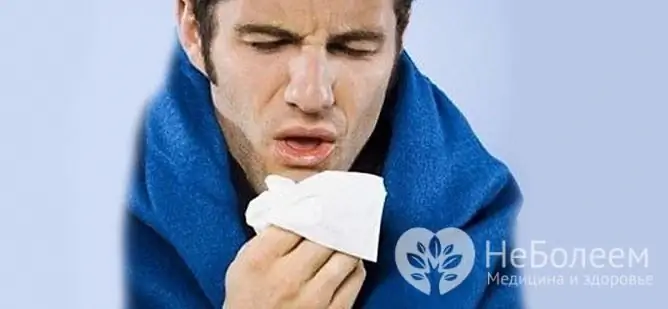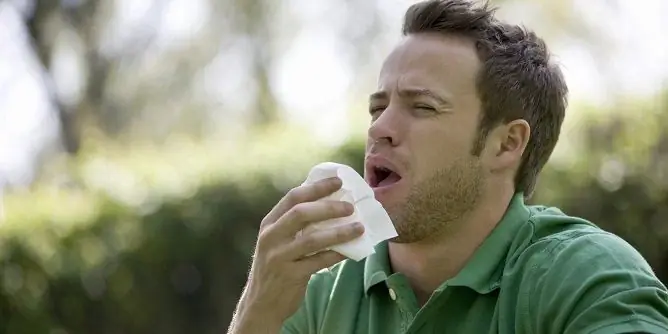- Author Rachel Wainwright wainwright@abchealthonline.com.
- Public 2023-12-15 07:39.
- Last modified 2025-11-02 20:14.
Coughing fits before vomiting in adults: treatment and causes
The content of the article:
- How to treat a dry, strong cough before vomiting in adults
- How does a cough before vomiting manifest in adult patients?
- Why adult patients may have a cough before vomiting
- Video
Coughing up to vomiting in adults can occur on its own or be a clinical sign of a number of diseases. If it occurs repeatedly, then, as a rule, it indicates a serious illness, so you should not postpone the visit to the doctor. For the same reason, self-medication is highly discouraged.

Attacks of coughing up to vomiting can be caused by various diseases that require diagnosis
Treatment of a cough that leads to vomiting depends on the cause that caused the development of the pathological process, and this cause should be established as early as possible. It is important to find out whether vomiting is triggered by a cough, or whether it is a symptom of any concomitant disease.
How to treat a dry, strong cough before vomiting in adults
With a dry cough and the absence of accumulations of sputum in the respiratory tract, the patient may be prescribed antitussive drugs. However, you need to understand that the cough itself plays an important role - it expels irritating agents from the respiratory tract, so such funds are used limitedly. If the cough is dry for the reason that the sputum is too viscous and poorly excreted, then mucolytic and expectorant drugs are used to liquefy it and facilitate its removal from the respiratory tract. Antitussives are not used in conjunction with expectorants, as this can lead to stagnation of mucus in the airways and the development of severe complications.
Depending on the cause of the disease, the patient can also be prescribed antiviral, antibacterial or antimycotic drugs (depending on the type of infectious agent, if any), antihistamines.
In addition to the main treatment, herbal medicine can be used. So, expectorant and anti-inflammatory effects are possessed by licorice root, plantain, chamomile, sage, thyme, eucalyptus, wild rose, St. John's wort, wild rosemary, oregano.
The most effective treatments for coughing include inhalation. They can be carried out in a medical institution or at home using an inhaler, or you can simply breathe in steam over a container with a solution. Steam (hot) inhalations are especially popular due to their simplicity and availability, but they can be done only if the patient does not have an elevated body temperature.
In case of diseases of the lower respiratory tract, steam inhalations are ineffective, in this case cold inhalations using a nebulizer will help (inhalations in a child are recommended only with a nebulizer). Such inhalations can be performed even at elevated temperatures. The advantages of a nebulizer include the possibility of using drugs for inhalation, which lose their effectiveness when heated. Cold inhalation eliminates the possibility of a patient getting a burn of the respiratory tract.
Depending on the disease, some medications, saline solution, soda solution, alkaline mineral water, salt solution, sea water, solutions based on medicinal herbs (decoctions or infusions), essential oils are used as a solution for inhalation. Inhalations with oils of eucalyptus, fir, peppermint, sage are popular.
At home, you can breathe steam over a container of boiled potatoes, to which you can also add aromatic oils. All inhalations have contraindications that must be taken into account. For example, inhalation with essential oils is not used for allergies or a tendency to it.
If, during inhalation, the patient has a persistent cough, dizziness, deterioration of the general condition, you need to stop the procedure and consult a doctor.
If a severe cough is caused by bronchial asthma, medications are used in the form of inhalers or sprays.
From folk remedies, mustard plasters and warming compresses are used, which can be made on the basis of boiled potatoes, cottage cheese, honey cakes (mixed in an equal ratio of honey, flour and vegetable oil) are popular.
The patient's chest and back can be rubbed with honey, interior fat. It is advisable to carry out the procedure at night, after which it is recommended to wrap the patient in a warm blanket. Rubbing should not be done at elevated body temperature.
For a patient with a severe cough, an abundant warm drink is recommended. You can drink tea with linden, viburnum, raspberries, ginger, currants. It is recommended to include more vegetables and fruits in the diet. Popular recipes include warm milk with honey and butter. Chest collection helps well, it is recommended to drink 3-4 times a day. You can alleviate the condition by regularly ventilating and humidifying the air in the room where it is located. In some cases, with a strong cough with urge to vomit, breathing exercises can help.
How does a cough before vomiting manifest in adult patients?
At the initial stages of colds and viral infections, patients often have an irritating dry cough, which then turns into a wet cough. The cough is accompanied by pain in the chest, fever, headache, and general weakness. After a while, sputum begins to separate. Some coughing spells can trigger vomiting.
With parainfluenza, the patient usually has a barking cough, which is accompanied by wheezing and vomiting.
With whooping cough, the patient is worried about a severe paroxysmal cough, in which the gag reflex is often triggered. When the patient begins to sputum, his condition usually improves.

A strong cough can be accompanied by an increase in body temperature - this is typical for infectious and inflammatory processes
With tracheitis, in addition to coughing, weakness and fatigue, chest pains, high fever are observed. A coughing attack, as a rule, begins suddenly; it can be provoked by inhalation of cold air, chemical vapors, and cigarette smoke. When coughing, purulent sputum can be separated, and the attack itself in some cases ends with vomiting.
In acute bronchitis, the cough is initially dry, then the patient develops a severe wet cough. In the chronic form of the disease, the cough can be barking, often occurs while the patient is in a dusty or cold room. In the morning, coughs in patients with bronchitis may worsen, leading to vomiting.
Bronchiolitis most often develops in children, but can occur in elderly and debilitated patients. With this disease, obstruction of the bronchioles is observed. In the early stages of bronchiolitis, the lumen of the bronchiole can be clogged by dead cells and leukocytes. Also, with this disease, there can be an overgrowth of connective tissue, epithelial necrosis, edema of the walls of the bronchioles.
Patients with bronchiolitis often develop a cough that turns into vomiting, which leads to dehydration of the body. Also, patients may experience expiratory dyspnea, tachypnea, wheezing, cyanosis of the nasolabial triangle. In the absence or improper treatment of the disease, serious complications (apnea, respiratory failure) and death can occur, therefore, if bronchiolitis is suspected, you should immediately contact a pediatrician or a physician (depending on the patient's age).
With pneumonia, severe cough is accompanied by chest pain, fever, and the separation of rusty sputum. A cough attack can lead to vomiting.
An allergic cough in a patient may be accompanied by nasal discharge, lacrimation, an itchy sensation in the throat and / or nasal cavity, and sneezing. The cough usually occurs upon contact with an allergen or develops some time after contact. With a strong cough against a background of allergies, a person may experience a gag reflex.
With bronchial asthma, a strong cough can also turn into vomiting, most often this happens at the initial stages of the disease. When coughing, glassy sputum is separated. A cough with this disease can end with an attack of suffocation.
With tuberculosis, patients may have a terrible, excruciating cough, blood is found in the sputum. Intense coughing fits can lead to vomiting.
With lung cancer, a severe, excruciating cough can worsen the patient's quality of life, disturbing him a significant part of the time. Severe coughing up to vomiting and difficulty breathing can also occur with laryngeal cancer.
With helminthic invasions (especially with ascariasis), when the worms move into the lungs, the patient develops a strong dry cough, which can cause vomiting. In addition, the patient often has a rash on the skin, an increase in body temperature. Liver disorders, intestinal obstruction, and accumulation of pus in the lungs may develop.
Smokers with more experience in the morning have bouts of severe coughing, which can go as far as vomiting. At the end of the attack, viscous sputum separates.
Why adult patients may have a cough before vomiting
The immediate cause of the development of coughing before vomiting is convulsive seizures during contraction of the diaphragm. Such a cough is one of the most common symptoms of diseases of the respiratory tract; it can also occur with pathologies of other organs and systems.

Vomiting when coughing can be caused by profuse mucous discharge
A gag reflex can be caused by the accumulation of mucus in the nasopharynx, which flows down the back of the pharynx, irritates the larynx, causes a reflex cough, and, when swallowed, provokes nausea and vomiting. Coughing up to vomiting is also observed with advanced diseases of the respiratory tract against the background of improper treatment or its absence.
A cough that is accompanied by vomiting can occur in acute respiratory viral diseases (ARVI), influenza, parainfluenza, tracheitis, bronchitis (acute and chronic), pneumonia, allergies, bronchial asthma, tuberculosis, lung cancer or neoplasms in other organs of the respiratory system, bronchiolitis …
It can also be observed with whooping cough, diphtheria, gastroesophageal reflux disease, endocrine disorders, and helminthic invasions. In addition, this symptom may accompany prolonged smoking, foreign bodies entering the respiratory tract, and taking certain medications.
Video
We offer for viewing a video on the topic of the article.

Anna Aksenova Medical journalist About the author
Education: 2004-2007 "First Kiev Medical College" specialty "Laboratory Diagnostics".
Found a mistake in the text? Select it and press Ctrl + Enter.






